Mario Alviano
University of Calabria
A framework for Conditional Reasoning in Answer Set Programming
Jun 04, 2025Abstract:In this paper we introduce a Conditional Answer Set Programming framework (Conditional ASP) for the definition of conditional extensions of Answer Set Programming (ASP). The approach builds on a conditional logic with typicality, and on the combination of a conditional knowledge base with an ASP program, and allows for conditional reasoning over the answer sets of the program. The formalism relies on a multi-preferential semantics (and on the KLM preferential semantics, as a special case) to provide an interpretation of conditionals.
Explanations for Answer Set Programming
Aug 30, 2023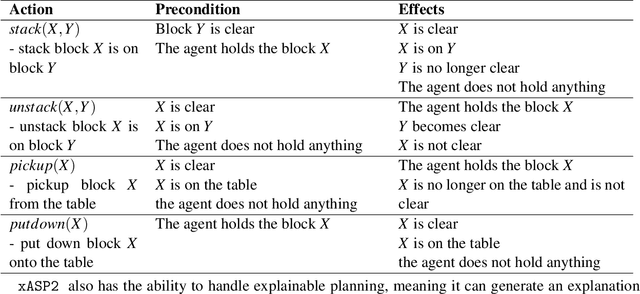
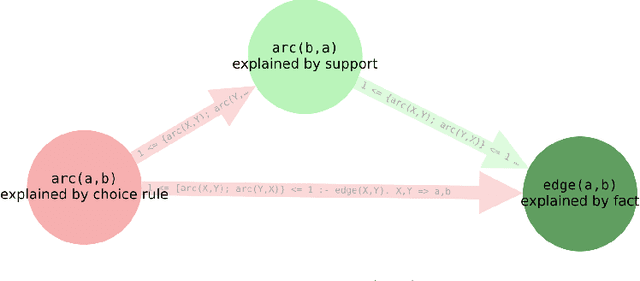
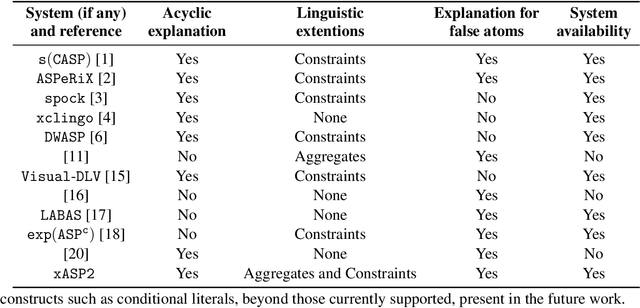
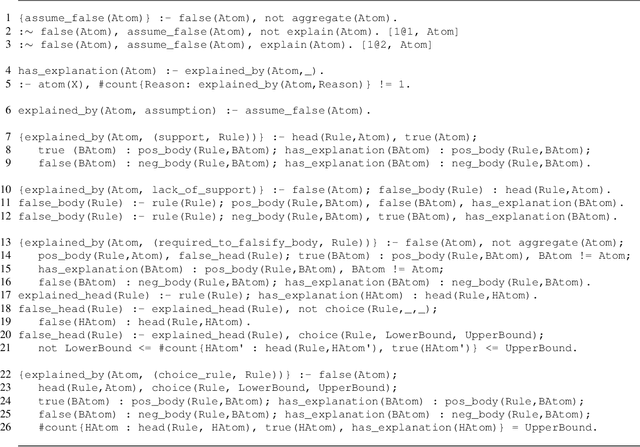
Abstract:The paper presents an enhancement of xASP, a system that generates explanation graphs for Answer Set Programming (ASP). Different from xASP, the new system, xASP2, supports different clingo constructs like the choice rules, the constraints, and the aggregates such as #sum, #min. This work formalizes and presents an explainable artificial intelligence system for a broad fragment of ASP, capable of shrinking as much as possible the set of assumptions and presenting explanations in terms of directed acyclic graphs.
* In Proceedings ICLP 2023, arXiv:2308.14898
Rethinking Answer Set Programming Templates
Jul 12, 2023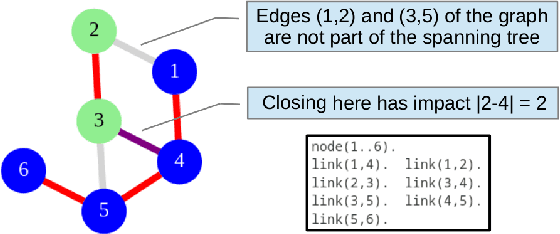


Abstract:In imperative programming, the Domain-Driven Design methodology helps in coping with the complexity of software development by materializing in code the invariants of a domain of interest. Code is cleaner and more secure because any implicit assumption is removed in favor of invariants, thus enabling a fail fast mindset and the immediate reporting of unexpected conditions. This article introduces a notion of template for Answer Set Programming that, in addition to the don't repeat yourself principle, enforces locality of some predicates by means of a simple naming convention. Local predicates are mapped to the usual global namespace adopted by mainstream engines, using universally unique identifiers to avoid name clashes. This way, local predicates can be used to enforce invariants on the expected outcome of a template in a possibly empty context of application, independently by other rules that can be added to such a context. Template applications transpiled this way can be processed by mainstream engines and safely shared with other knowledge designers, even when they have zero knowledge of templates.
A preferential interpretation of MultiLayer Perceptrons in a conditional logic with typicality
May 11, 2023Abstract:In this paper we investigate the relationships between a multipreferential semantics for defeasible reasoning in knowledge representation and a multilayer neural network model. Weighted knowledge bases for a simple description logic with typicality are considered under a (many-valued) ``concept-wise" multipreference semantics. The semantics is used to provide a preferential interpretation of MultiLayer Perceptrons (MLPs). A model checking and an entailment based approach are exploited in the verification of conditional properties of MLPs.
Complexity and scalability of defeasible reasoning in 1 many-valued weighted knowledge bases
Mar 08, 2023Abstract:Weighted knowledge bases for description logics with typicality under a "concept-wise'' multi-preferential semantics provide a logical interpretation of MultiLayer Perceptrons. In this context, Answer Set Programming (ASP) has been shown to be suitable for addressing defeasible reasoning in the finitely many-valued case, providing a $\Pi^p_2$ upper bound on the complexity of the problem, nonetheless leaving unknown the exact complexity and only providing a proof-of-concept implementation. This paper fulfils the lack by providing a $P^{NP[log]}$-completeness result and new ASP encodings that deal with weighted knowledge bases with large search spaces.
Many-valued Argumentation, Conditionals and a Probabilistic Semantics for Gradual Argumentation
Dec 14, 2022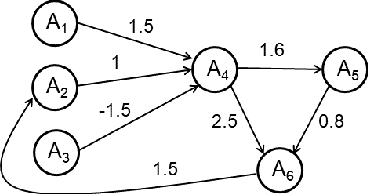
Abstract:In this paper we propose a general approach to define a many-valued preferential interpretation of gradual argumentation semantics. The approach allows for conditional reasoning over arguments and boolean combination of arguments, with respect to a class of gradual semantics, through the verification of graded (strict or defeasible) implications over a preferential interpretation. As a proof of concept, in the finitely-valued case, an Answer set Programming approach is proposed for conditional reasoning in a many-valued argumentation semantics of weighted argumentation graphs. The paper also develops and discusses a probabilistic semantics for gradual argumentation, which builds on the many-valued conditional semantics.
ValAsp: a tool for data validation in Answer Set Programming
Feb 19, 2022
Abstract:The development of complex software requires tools promoting fail-fast approaches, so that bugs and unexpected behavior can be quickly identified and fixed. Tools for data validation may save the day of computer programmers. In fact, processing invalid data is a waste of resources at best, and a drama at worst if the problem remains unnoticed and wrong results are used for business. Answer Set Programming (ASP) is not an exception, but the quest for better and better performance resulted in systems that essentially do not validate data. Even under the simplistic assumption that input/output data are eventually validated by external tools, invalid data may appear in other portions of the program, and go undetected until some other module of the designed software suddenly breaks. This paper formalizes the problem of data validation for ASP programs, introduces a language to specify data validation, and presents \textsc{valasp}, a tool to inject data validation in ordinary programs. The proposed approach promotes fail-fast techniques at coding time without imposing any lag on the deployed system if data are pretended to be valid. Validation can be specified in terms of statements using YAML, ASP and Python. Additionally, the proposed approach opens the possibility to use ASP for validating data of imperative programming languages. Under consideration for acceptance in TPLP.
Aggregate Semantics for Propositional Answer Set Programs
Sep 17, 2021



Abstract:Answer Set Programming (ASP) emerged in the late 1990ies as a paradigm for Knowledge Representation and Reasoning. The attractiveness of ASP builds on an expressive high-level modeling language along with the availability of powerful off-the-shelf solving systems. While the utility of incorporating aggregate expressions in the modeling language has been realized almost simultaneously with the inception of the first ASP solving systems, a general semantics of aggregates and its efficient implementation have been long-standing challenges. Aggregates have been proposed and widely used in database systems, and also in the deductive database language Datalog, which is one of the main precursors of ASP. The use of aggregates was, however, still restricted in Datalog (by either disallowing recursion or only allowing monotone aggregates), while several ways to integrate unrestricted aggregates evolved in the context of ASP. In this survey, we pick up at this point of development by presenting and comparing the main aggregate semantics that have been proposed for propositional ASP programs. We highlight crucial properties such as computational complexity and expressive power, and outline the capabilities and limitations of different approaches by illustrative examples.
The pyglaf argumentation reasoner (ICCMA2021)
Sep 07, 2021Abstract:The pyglaf reasoner takes advantage of circumscription to solve computational problems of abstract argumentation frameworks. In fact, many of these problems are reduced to circumscription by means of linear encodings, and a few others are solved by means of a sequence of calls to an oracle for circumscription. Within pyglaf, Python is used to build the encodings and to control the execution of the external circumscription solver, which extends the SAT solver glucose and implements algorithms taking advantage of unsatisfiable core analysis and incremental computation.
Modal Logic S5 Satisfiability in Answer Set Programming
Aug 09, 2021

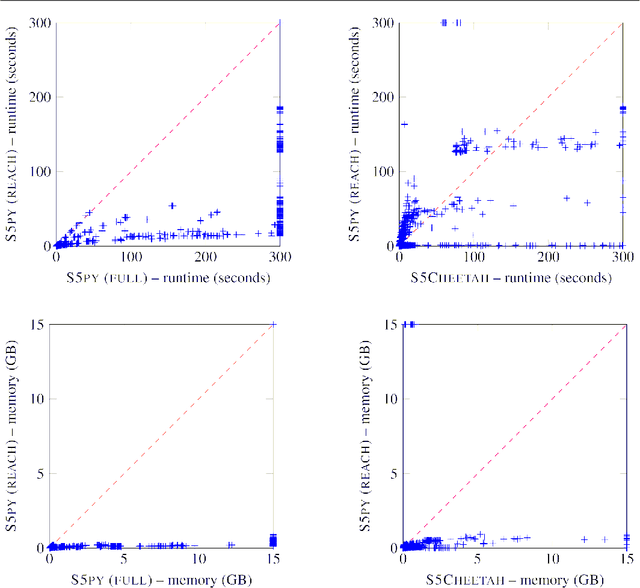

Abstract:Modal logic S5 has attracted significant attention and has led to several practical applications, owing to its simplified approach to dealing with nesting modal operators. Efficient implementations for evaluating satisfiability of S5 formulas commonly rely on Skolemisation to convert them into propositional logic formulas, essentially by introducing copies of propositional atoms for each set of interpretations (possible worlds). This approach is simple, but often results into large formulas that are too difficult to process, and therefore more parsimonious constructions are required. In this work, we propose to use Answer Set Programming for implementing such constructions, and in particular for identifying the propositional atoms that are relevant in every world by means of a reachability relation. The proposed encodings are designed to take advantage of other properties such as entailment relations of subformulas rooted by modal operators. An empirical assessment of the proposed encodings shows that the reachability relation is very effective and leads to comparable performance to a state-of-the-art S5 solver based on SAT, while entailment relations are possibly too expensive to reason about and may result in overhead. This paper is under consideration for acceptance in TPLP.
 Add to Chrome
Add to Chrome Add to Firefox
Add to Firefox Add to Edge
Add to Edge